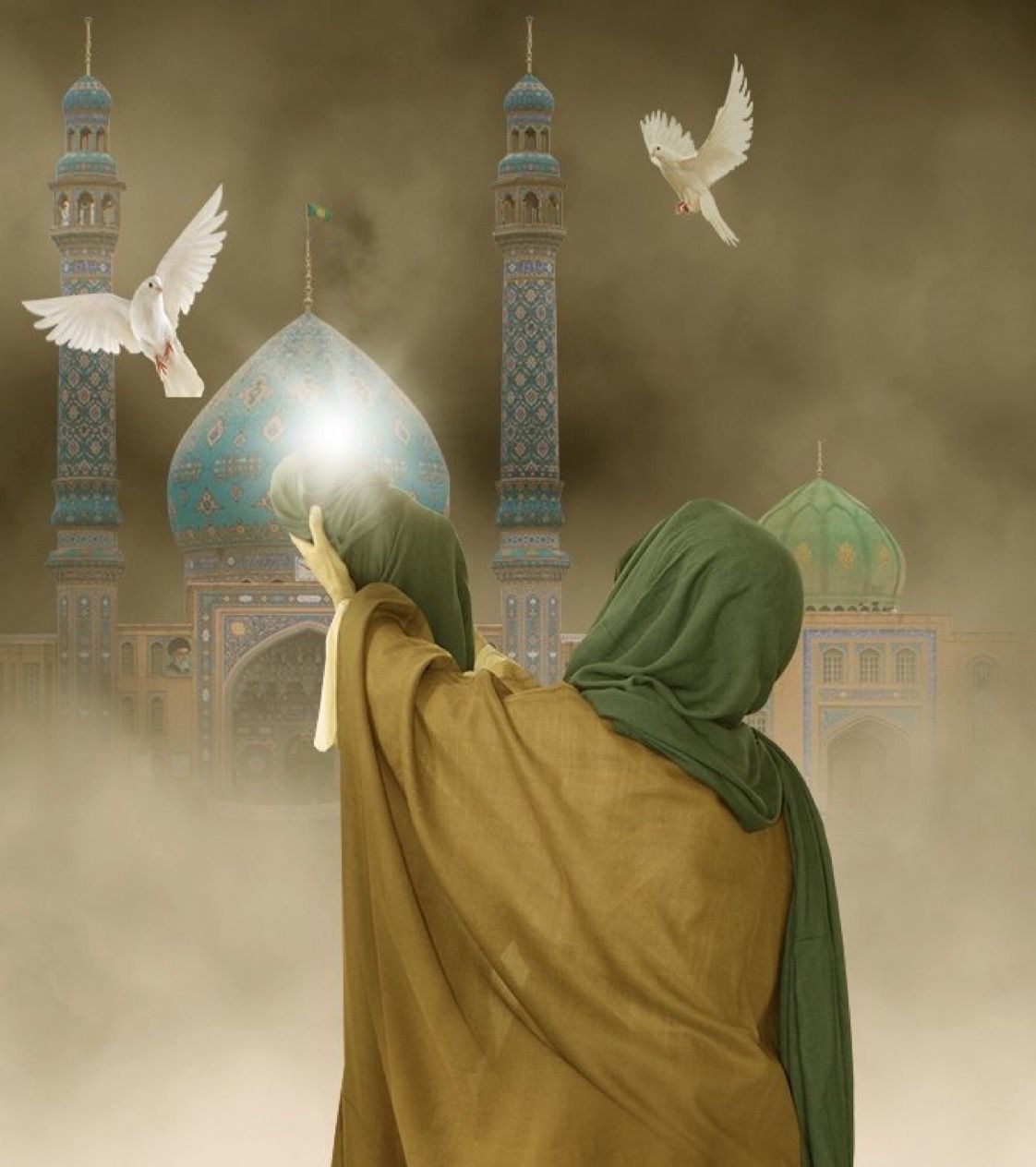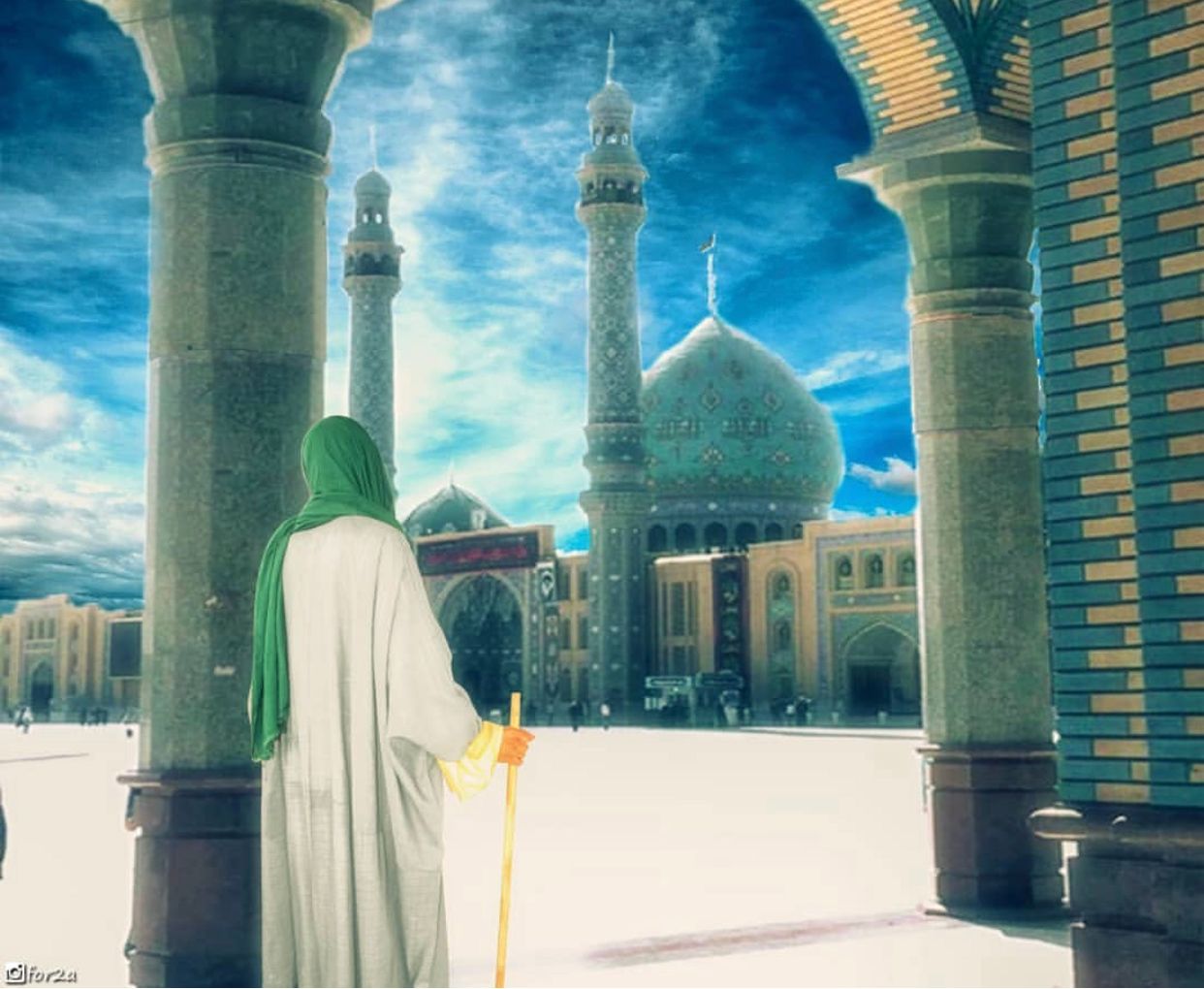The Awaited Saviour

Salam,
The 15th of Sha’ban is one of the most important dates in the Islamic calendar.
But why is it given such significance?
This is something I hope to address in this article, and like the last post(Arba'een 2021), this issue deserves elucidation. God willing, I will be able to shed some light on the subject.
For a detailed look at rational objections, there is a link to an extension article at the end of this one.
The artwork is mostly by @nabihaiderali @for2a
Reference: Books/Articles on the subject by Ayatollah Murtaza Mutahhari and Ayatollah Muhammad Baqir us Sadr.

The 15th of Sha’ban, 255 A.H (868 A.D), marks the birth of the 12th imam of the imamiyah sect. A figure more legendary than that of the Mahdi, the Awaited Saviour, has not been seen in the history of mankind. The threads of the world events have woven many a fine design in human life but the pattern of the Mahdi stands high above every other pattern. He has been the vision of the visionaries in history. He has been the dream of all the dreamers of the world. For the ultimate salvation of mankind, he is the Pole Star of hope on which the gaze of humanity is fixed.
The Qur'anic prophecy of the inevitable victory of Islam will be realized following the advent of the Mahdi, who will fight the wrong, remedy the evils and establish a world order based on the Islamic teachings of justice and virtue.
In this quest for the truth about the Mahdi, there is no distinction of any caste, creed, or country. The quest is universal, precisely in the same way as the Mahdi himself is universal. He stands resplendent high above the narrow walls in which humanity is cut up and divided. He belongs to everybody. For all that and much more, what exactly is the Mahdi? Indeed that is the big question which the thinking people all over the world would like to ask.
It is only Islam that has given this concrete shape to an abstract idea. The Mahdi is not to be born in the distant future. He is already living amongst us and shares our joys and sorrows.
His appearance will mean not only the materialization of an Islamic aspiration but will also be the realization of a hope cherished by the entire humanity.
Prof. Henry Corbin of Sorbonne University says:
"To my mind, the Shi'ite is the only sect that has preserved and perpetuated the link of Divine guidance between man and God through its belief in the Imamate. According to the Jews, the Prophethood, a real link between man and God, ended with Moses. They do not believe in the Prophethood of Jesus and Muhammad. The Christians, too, do not go beyond Jesus. The Sunnite sect has also stopped at the Prophet Muhammad and believes that the link between man and God has been severed with the end of the Prophethood".
It is only the Twelver Shi'ah who believe that the link still exists through the Mahdi and will continue to exist forever.

The Sunnite scholars have also mentioned and recorded hundreds of traditions about the Mahdi in more than seventy books by their own valued and dependable authorities:
• Musnad - Ahmad b. Hanbal (d. 241 A.H.)
• Sahih Bukhari - Muhammad b. Ism'ail Bukhari (d. 256 A.H.)
• Sahih Muslim -Muslim b. Hajjaj Nishapuri (d.261 A.H.)
• Sunan Abi Dawud - Sulayman b. Ash'ath Sijistani (d. 275 A.H.)
• Sahih Tirmizi -Muhammad b. Isa Tirmizi (d. 279A.H.)
The other facts which can be gleaned from the prophecies of the holy Prophet about the Mahdi are briefly stated below:
a. He will bear the same nomenclature as the holy Prophet.
b. He will not be bearing allegiance to any tyrant.
c. He will fill the earth with justice and fair play after its having been filled with injustice and tyranny.
d. At the time of his advent, he will be found leaning against the wall of the Ka'bah. He will call together his 313 supporters, who will respond to his call and gather around him. Then he will lead the congregational prayers.
e. He will establish Islamic law in the whole world.
f. On his second advent, Jesus will offer prayers behind him.
According to Islamic traditions, Jesus will descend from heaven and espouse the cause of the Mahdi. The Christians and the Jews will see him and recognize his true status. The Christians will abandon their faith in his godhead.

The Mahdi is not only an embodiment of Islamic belief but also the symbol of an aspiration cherished by mankind irrespective of its divergent religious doctrines. There are references to him in different religions ranging from “Son Of Man” in the Bible (Christianity) to martyr faiths such as Tamil folk religion, the piece above is by a Tamil revert. He is also the crystallization of an instructive inspiration through which all people, regardless of their religious affiliations, have learned to await a day when a heavenly mission, with all its implications, will achieve their final goal and the tiring march of humanity across history will culminate satisfactorily in peace and tranquillity.
This consciousness of the expected future has not been confined to those who believe in supernatural phenomena but has also been reflected in the ideologies and cults which deny the existence of what is imperceptible. For example, dialectical materialism, which interprets history on the basis of contradictions, believes that a day will come when all contradictions will disappear, and complete peace and tranquillity will prevail. Thus we find that this consciousness experienced throughout history is one of the widest and the commonest psychological experience of humanity.
Although the concept of the Mahdi is more widespread than in the Muslim community, its detailed features, as determined by Islam, meet more fully all the aspirations attached to it since the dawn of history. They are in greater conformity with the feelings and sentiments of the oppressed and the persecuted of all times. It is Islam that has given a concrete shape to an abstract idea. It is no longer necessary to look forward to an unknown saviour who may come into the world in a distant future.
The religion, when it endorses this common consciousness and stresses that in the long run this world will be filled with justice and equity after having been filled with injustice and oppression, gives it a factual value and converts it into a definite belief in the future course of humanity. This belief is not merely a source of consolation, but it is also a source of virtue and strength. It is a source of virtue because the belief in the Mahdi means the total elimination of injustice and oppression prevailing in the world. It is a source of inexhaustible strength because it provides hope which enables man to resist frustration, howsoever, hopeless and dismal the circumstances may be.
The saviour is already here and we simply have to look for the day when the circumstances are ripe for him to appear and begin his great mission. The Mahdi is no longer an idea. He is no longer a prophecy. We need not wait for his birth. He already exists, actually and we only wait for the inauguration of his role. He is a specific entity living among us in his real human form and shares our hopes, disappointments, joys, and griefs. He witnesses all the acts of oppression and persecution which are perpetrated on the face of the earth, and, somehow or another; he is affected by them. He is anxiously awaiting the moment when he will be able to extend his helping hand to everyone to whom any wrong has been done and be able to eradicate injustice and oppression completely.


Optimism about the Future of Humanity
There are divergent views about the future. There are some who believe that adversity, distress, disorder, and mischief are a lot of humanity and on that account, life has no value. In the eyes of such people, the most judicious action would be to put an end to life.
Some others think that human life has already been thrown into disarray. They believe that, following the marvelous technological progress and the accumulation of huge stockpiles of the means of mass destruction, mankind has reached a stage where its final annihilation is Imminent. The English philosopher, Bertrand Russell, says in his book, 'New Hopes' that there are people, including Einstein, who see the possibility of man having completed his span of life and think that with his wonderful scientific skill, he may, in a few years, succeed in completely exterminating himself.
According to this theory, there is a great possibility of the total extinction of the human race just when it is on the threshold of attaining maturity. If we rely on perceptible evidence only, such a possibility cannot be ruled out.
According to another theory, distress and disorder are not a part of human nature. Nor will the tragedy of collective suicide ever take place. In fact, a very happy and bright future awaits humanity. A great man will appear who will uproot all corruption and mischief. This is a religiously inspired theory and it is in this context that Islam gives the glad tidings of Mahdi's revolution. Its salient features will be:
• Final victory of righteousness, virtue, peace, justice, freedom, and truth over the forces of egoism, subjugation, tyranny, deceit, and fraud.
• Establishment of a world government (one government in the whole world).
• Reclamation and rehabilitation of the whole earth so that no area remains waste.
• Attainment of full sagacity by mankind, adherence to ideology, and emancipation from animal impulses and undue social restrictions.
• Maximum utilization of the gifts of the earth.
• Equal distribution of wealth and property among all human beings.
• Complete eradication of all vices like adultery, fornication, usury, use of intoxicants, treachery, theft, homicide, and the total disappearance of abnormal complexes, malice, and ill-will.
• Eradication of war and restoration of peace, friendship, cooperation, and benevolence.
• Complete coherence between man and nature.

The Final Victory
The idea of the final victory of the forces of righteousness, peace, and justice over those of evil, oppression, and tyranny, of the worldwide spread of the Islamic faith, the complete and all-round establishment of high human values, the formation of a utopian and an ideal society and lastly the accomplishment of this ideal at the hands of a holy and eminent personality called, according to the Islamic traditions, Mahdi is a belief which, of course with variations in details, is shared by all the Muslim sects and schools of thought.
Basically, this is a Qur'anic concept, and it is the holy Qur'an that, in very clear terms, predicts:

1. The final victory of Islam.
“It is He who has sent His messenger with the guidance and the religion of truth to make it prevail over every other religion. However much the disbelievers may dislike it.” (Surah al-Tawbah, 9:33 and Surah As-Saff, 61:9)

2. The absolute supremacy of the good and the pious.
“Indeed We have written in the Psalms after the Torah had been revealed: The righteous among My slaves shall inherit the earth.” (Surah al-Anbia. 21:105)

3. The final collapse of the oppressors and the tyrants.
“We willed to show favor to those who were persecuted on the earth and to make them leaders and masters. It was also Our will to give them power in the earth and to show Pharaoh, Haman, and their hosts to experience from their victims what they feared most.”(Surah al-Qasas, 28:5-6)

4. A bright and happy future for humanity.
“Moses told his people to seek help from Allah and exercise patience. The earth belongs to Him, and He has made it the heritage of whichever of His servants He chooses. The Final Victory is for the pious.” (Surah al-A'raf 7:128). This idea is not an outcome of any wishful thinking, but it emanates from the total working of the system of nature, the evolutionary process of history, man's confidence in the future, and his total rejection of pessimism about the destiny of mankind, which is extraordinarily bleak, according to certain theories(which were discussed earlier)
In addition to the direct references to the Mahdi in Sahih Bukhari and Sahih Muslim, there are also almost 50 traditions, with direct reference to the Mahdi, in other well-known collections such as Abu Daud, Tirmizi, Musnad-i Ahmad bin Hanbal, Ibn Maja, Tabarani (in all the three collections: Al-Kabir, Al-Awsat and Al-Saghir), Al-Hakim (Mustadrak), Abu Ya'li, al-Bazzar, Ibn Hibban, Abu al-Shaykh (Kitab al-Fitan), Ibn Asakir, Ibn Adi, Abu Na'im (Akhbar al-Mahdi), Al-Royani (Musnad), al-Dailami, Al-Dani (Sunan), Ibn Mandah, Na'im ibn Hammad (Kitab al-Fitan), Al-Harith ibn Ali Usamah (Musnad), Al-Khatib al-Baghdadi (Tarikh), Ibn Abi Shaibah (Musannaf), Al-Darqutni, Abu Na'im (Dalail al-Nubuwwah and al-Hilyah), Ibn al-Munadi (Al-Malahim), Abu Ghannam al-Kufi (Kitab al-Fitan), Tammam (Fawaid), Ibn Sa'd (Tabaqat), Ibn Jarir (Tafsir), Al-Muhami (Al-Amali), etc.
These authoritative source books contain almost 50 traditions of the Prophet (Peace and benediction be upon him and his infallible progeny) which foretell the emergence of the Mahdi before the Day of Resurrection. Many of these traditions are 'Sahih' and directly narrated on the authority of the Prophet by 33 well-known companions, who include: Ali ibn Abi Talib, Husayn ibn Ali, Abu Sa'id al-Khudari, Abdullah ibn Mas'ud, Umm Salmah, Thauban, Abu Hurayrah, Anas ibn Malik, Jabir ibn Abdullah, Uthman ibn Affan, Awf ibn Malik, Talha ibn Ubaidallah, Huzaifah ibn al-Yaman, Umran ibn Husayn, Abdullah ibn Umar, Ayesha, Abdul Rahman ibn Awf, Abu Ayyub al-Ansari, Ibn Abbas, Tamim al-Dari, Umm Habibah, Abbas ibn Abdul Muttalib, and Ammar ibn Yasir.
The most famous of these traditions is the one narrated by Abdullah ibn Mas'ud in which the Prophet said: "Even if a (single) day is left in (the life of) the world, Allah will lengthen that day to send a person of my House whose name will be like my name and whose Kunyah will be similar to mine. He will fill the world with justice and equity just as it was previously full of injustice and oppression". (Abu Daud, Tabarani, Ibn Hibban, Hakim, Ibn Maja, Abu Na'im, Ibn Asakir etc).
END
Originally posted on March 19, 2022 (15th of Sha'ban)
Extension article :


